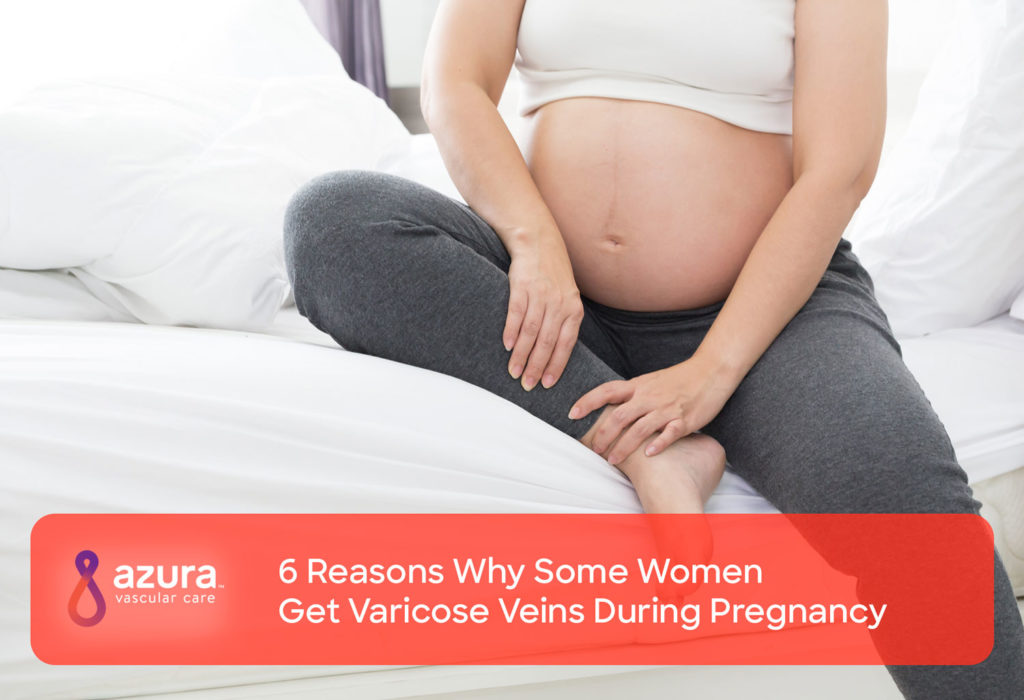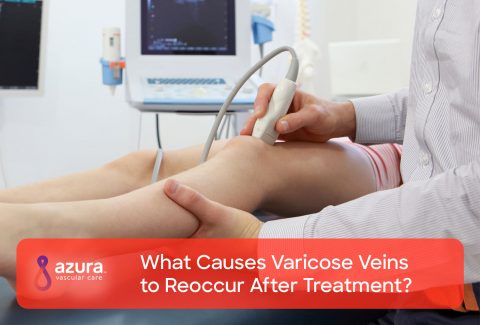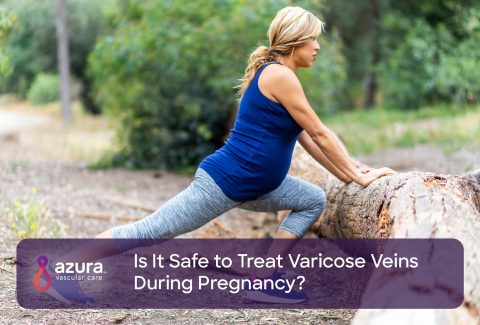
For many women, pregnancy is an amazing experience, but it’s not always entirely comfortable. While nausea is the first uncomfortable part of pregnancy that generally comes to mind, varicose veins during pregnancy are another common complaint that women have.
Varicose veins are those purple or blue bulging and twisted veins that appear on the legs, and pregnancy is one of the risk factors for developing them. i
Why do some women get varicose veins during pregnancy, and what can be done about them?
Veins carry blood toward the heart. Arteries have thick, muscular walls able to withstand very high pressure and push the blood away from the heart. Veins are thinner and more pliable. Unlike arteries, veins have one-way valves to prevent blood from flowing backwards. In the legs, the contraction of the leg muscles helps to move blood through the veins. When these valves don’t work well, or when the pressure inside the vein is too much, the veins enlarge and become varicose veins.
6 Reasons Why Women May Develop Varicose Veins During Pregnancy
There are many changes to a woman’s body during pregnancy, and some of these changes impact veins. While these changes are natural during a healthy pregnancy, they also unfortunately may increase the risk of developing varicose veins during pregnancy. But why is this?
Following are the 6 top reasons why women may develop varicose veins during pregnancy.
- Increased blood: The amount of blood in your body increases during pregnancy. This can increase pressure, and your veins can expand. ii
- Hormones: Progesterone is an important hormone during pregnancy and is known to have a relaxing effect on your blood vessels. The changes to your vascular system and the increased pressure from your expanding uterus can contribute to the formation of spider and varicose veins.iii Related Article: How Hormones Contribute to Women Developing Varicose Veins
- Pressure on vein: The veins in your legs drain into the veins in your abdomen. As the fetus is growing in your uterus, the veins in the lower abdomen, or pelvis, can be constricted. Your leg veins get bigger as the pressure builds because the blood flow back to the heart is slowed. iv
- Gaining too much weight: Extra weight increases your risk of varicose veins by placing pressure on the veins. When you are pregnant, you can gain weight quickly and it can be hard for your body to adjust to this sudden increase in weight. ii
- Genetics: If varicose veins run in your family, you are at a higher risk to get them, pregnant or not. Pregnancy increases your risk by adding more stress to your veins. ii
- Not moving: Sitting or standing for long periods of time increases the stress on the veins. Whether it is from being tired, because it’s increasingly more difficult to move, or for other pregnancy-related health reasons, pregnant women who are not able to get active are prone to getting varicose veins. i
Varicose Veins Can Cause Real Problems During Pregnancy
Some women’s biggest complaint about varicose veins during pregnancy are that they’re not pretty to look at, but keep in mind that, for pregnant women, the appearance isn’t the only problem varicose veins can cause. If you’re pregnant and have varicose veins, you can also experience leg pain, discomfort, swelling, throbbing or itching.
Pregnant and Have Varicose Veins? Here’s What You Can Do…
The good news is that varicose veins that appear during pregnancy usually go away shortly after giving birth. i If you are pregnant and have bothersome varicose veins, you may not need to suffer through the rest of your pregnancy. There are things you can do to get some relief while you are still pregnant. To start to feel better now, you could:
- Get moving: If you are sitting or standing for a long time, make sure to change positions as often as possible. If your obstetrician says it’s ok, walking or other exercises that use your leg muscles can help move the blood along.
- Elevate your legs: Taking time throughout the day to raise your legs above the level of your heart may help move blood.
- Support your veins: Wearing maternity support hose can prevent swelling and counteract the pressure on the inside of your veins.
- Watch your weight: Talk with your obstetrician about how much weight is healthy for you to gain. If you gain weight too quickly, this can add stress to your veins. ii
Generally, during pregnancy, doctors try to avoid more invasive treatments for varicose veins, including both surgery and minimally invasive treatments. Treatment can be considered in very rare circumstances, such as severe bleeding.v Your varicose veins can go away after your baby is born, and most doctors will recommend that you wait at least 3 months after giving birth before considering these other options.iv
If you have bothersome varicose veins, talk to your obstetrician about your symptoms.
Sources:
i National Heart, Lung and Blood Institute. Who Is at Risk for Varicose Veins? https://www.nhlbi.nih.gov/health/health-topics/topics/vv/atrisk (updated 1/29/2016, accessed 11/30/2016)
ii Mayo Clinic, Varicose veins and pregnancy: Legs and more. http://www.mayoclinic.org/healthy-lifestyle/pregnancy-week-by-week/expert-blog/varicose-veins-and-pregnancy/bgp-20055799 (reviewed 4/10/2013, accessed 12/12/2016)
iii Lenkovi? M, et al. Effect of progesterone and pregnancy on the development of varicose veins. Acta Dermatovenerol Croat. 2009;17(4):263-7.
iv NHS, Varicose veins – Causes. http://www.nhs.uk/Conditions/Varicose-veins/Pages/Causes.aspx (reviewed 2/9/2014, accessed 12/12/2016)
v Varicose Veins in the Legs: The Diagnosis and Management of Varicose Veins. NICE Clinical Guidelines, No. 168. National Clinical Guideline Centre (UK). London: National Institute for Health and Care Excellence (UK); 2013 Jul. https://www.ncbi.nlm.nih.gov/pubmedhealth/PMH0080333/


